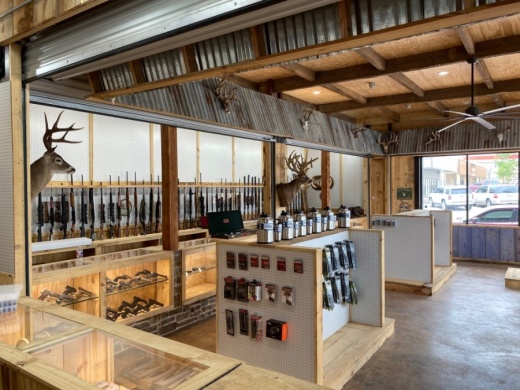“Election years are always positive years [in gun sales] because of the challenges to the Second Amendment,” said Yuna, who noted in mid-August that his sales had risen 150% year over year since February. “Primarily, what we’re seeing is a dramatic increase in first-time gun buyers. First-time gun buyers are somewhere between 32%-38% of what we’re seeing, which is unheard of.”
Total firearm background checks—including for permits, pawn redemption, rentals and private sales—totaled 1.36 million in Texas this year from January to July. With five months remaining in the year, the state is just about 358,000 shy of exceeding its 2016 number of 1.72 million checks, the state’s record since data was first collected in 1998, according to data from the National Instant Criminal Background Check System.
Although the number of firearm background checks does not necessarily represent the number of firearms sold, background checks for handguns, long guns and other firearms spiked in March in Texas, totaling 223,724 checks—a 138% increase year over year—according to NICS data.
“The gun business is a very unique business anyway, and very few businesses out there ... fluctuate the way we do based on what party’s in power or what politician makes a statement that they’re going to do something or not do something. A lot of people—for lack of a better word, they panic,” said Thom Bolsch, proprietor of Saddle River Range on FM 1488. In Texas, firearm background checks for handguns, long guns and other firearms were up 71.78% from 2016—the last presidential election year—for the period spanning February to July, NICS data shows. Bolsch said he estimates about 70% of gun sales in March at Saddle River were to first-time gun buyers, an increase from about 10% of customers regularly.
“Along comes this pandemic, and people were really fearful,” Bolsch said. “A lot of people came in, and they said, ‘We’ve never even touched a gun before,’ and that’s indicative of fear. That’s indicative of panic.”
Bolsch said his sales increased fourfold in March and April before another wave of panic hit amid protests of police brutality and calls for criminal justice reform across the nation.
“I will say our business is up. But I will also say ... our suppliers are having a hard time keeping up,” Bolsch said. “Our business model is only sustainable if we have product.”
Jeffrey Bearden, owner of Blackwood Gun Club in Conroe, said the industry has seen a shortage in firearms and ammunition, as manufacturers were transitioning their equipment to that needed for hunting season when COVID-19 hit this spring. As a result, few manufacturers have been able to meet the recent demand for firearms and ammunition.
“Gun sales would be astronomically through the roof if there was a large market of guns for us to be able to purchase to sell,” Bearden said.
Along with businesses, Bolsch said, customers have had to adapt, too, as firearms inventory shrinks.
“The days of us calling our distributors and saying, ‘Give us three of them and five of those and six of these'—that’s over. We call them now every day. ... ‘What do you have? What did you just get in?’” Bolsch said. “[Customers are] saying, ‘I’ll take it,’ because that’s all there is.”
Bolsch said Saddle River’s ammunition prices have doubled amid the nationwide shortage, so he has had to get creative in looking for ammunition to keep his gun range operational.
“We’re a gun range; if somebody wants to come in and shoot and we don’t have ammo for them, we’ve lost that business as well,” he said. “Some of our ammo costs have doubled. And unfortunately, you have to pass that on to the customer.”
Likewise, Bearden said the club has stopped ammunition sales to the public and is reserving any remaining ammunition for shooters on the gun range only.
“Our livelihood is range sales,” Bearden said.
Yuna said the Tomball store, established in 1983, ran out of common types of ammunition this spring, such as 9mm, for the first time in the store’s history.
“I think it’s kind of a toilet paper effect where when a customer goes to store after store after store and there’s no toilet paper, when they do see it, they buy it. I think that that’s contributing to [the ammunition shortage],” Yuna said.
Training, range activity
Not only are local business owners seeing increased gun and ammunition sales; shooting ranges and training classes have also been busier since the spring.Greg Charney of TX Arsenal in Pinehurst said the custom gun store opened March 3, just before the COVID-19 pandemic, with little inventory. Over the last few months, he said, the growing demand in the industry has helped him build a customer base, and the store already has plans to expand and offer training classes this fall.
“During COVID-19, people are home and restless, and we’re an outdoor activity, ... so you can come out here safely and not be crammed in a tight space,” Bearden said. “So the range itself, from that aspect, as something for people to do has dramatically increased also.”
The all-outdoor, 100-acre facility in Conroe has kept busy with events as well, even while adhering to COVID-19 precautions, he said.
Although the facility has upped cleaning measures and offered masks to customers, Bolsch said Saddle River’s 33,000-square-foot setup already allowed guests to maintain social distance with bulletproof walls between shooting stalls and an air handling system that moves lead and contaminants downrange out of the shooter’s respiratory zone.
Since the spring, Saddle River has at least tripled its number of classes to educate new gun owners, he said.
“When we sell a gun, we try to make sure they know how to operate it before they leave. By law, we don’t have any obligation to make sure someone knows how to fire a gun; our obligation is more that they’re legally able to purchase a gun,” Bolsch said. “We want people to know we’re safety-conscious; we want people to know we’re not here to sell you a gun. We’re here to help you with your purchase and make sure you’re comfortable with it.”





